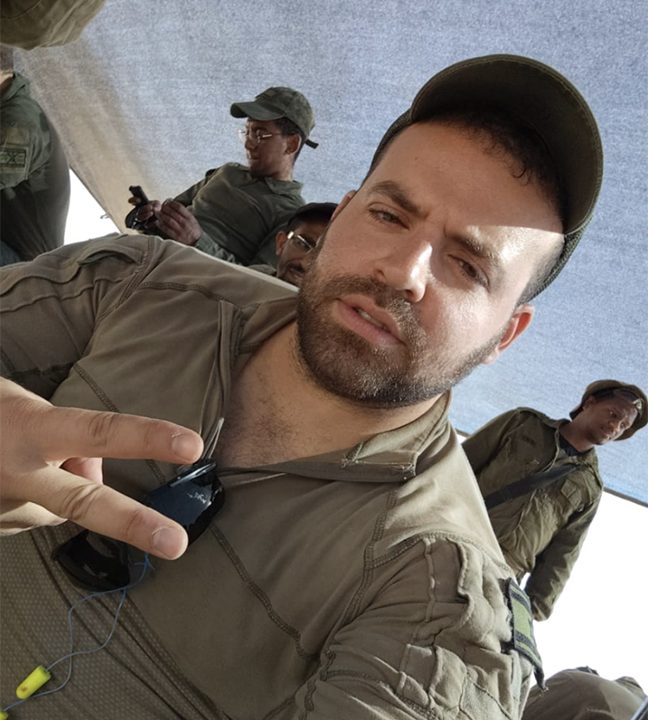For New Caledonia, ignored by anti-colonialists, an Israel invasion may be their only hope

New Caledonia. Photo by Sébastien Jermer/Wikimedia Commons
by Rafael Medoff
Illegal settlers! Occupied territories! Colonialism! Police brutality! Those accusations have been shouted with passion from tents on college campuses across America in recent weeks. But do those concerns apply only in select circumstances? Because an overseas conflict that should rouse the ire of the nation’s protesters has so far failed to attract their interest.
The site of the conflict that dare not speak its name is New Caledonia, an island nation 900 miles east of Australia, just slightly smaller than Israel. In recent months, the indigenous tribes there have been waging a battle for independence against the French colonialist authorities.
For nearly two hundred years, France has been illegally occupying the island country, exploiting its vast nickel reserves, and settling French citizens there irrespective of the wishes of its indigenous inhabitants, the Kanaks. Unlike Israeli Jews, who have strong historical, legal and religious ties to the land where they live, the French settlers in New Caledonia are just white Europeans who have pushed their way into somebody else’s country without permission.
In fact, the very name of the country is a sham. The British explorer James Cook, sailing in the vicinity in 1774, thought the mountains resembled the terrain of the Caledonia region of his native Scotland. Not surprisingly, the native Kanaks would prefer a name more authentic than the one a seafaring Scotsman chose for them.
The French seized New Caledonia in the 1850s because they needed a distant territory to serve as a penal colony. Thousands of French criminals finished their sentences and then took up residence in the country. Once again, the Kanaks had no say in the matter.
Major news outlets that have been devoting disproportionate attention to Gaza have paid scant attention to what’s been happening in New Caledonia. Last week, the New York Times belatedly reported that the French have been pouring security forces into the country to suppress the fight for independence. And the French parliament is enabling recently-arrived French citizens in New Caledonia to vote in future referenda, which could tilt the results against independence. The Times noted that a widely-circulated video shows French police officers “forcing a Kanak protester to his knees so that one officer could kick the man’s head.”
This must all come as quite a surprise to readers of the New York Times. Until last month, there had been just one article in the Times about the New Caledonian independence struggle in the past 10 years.
The major human rights groups that are so concerned about Gaza likewise have not shown much interest in the human rights of the Pacific island’s natives. Amnesty International issued its first-ever press release about New Caledonia last month. The last time Human Rights Watch issued a news release mentioning New Caledonia was 13 years ago — in a complaint about Israel arresting a Palestinian Arab rock-thrower who claimed he was in New Caledonia at the time of the attack.
What about America’s leading professional associations? In recent months, numerous groups of academics and other professionals who have no ostensible connection to the Middle East have been issuing denunciations of Israel for defending itself against Hamas.
The National Women’s Studies Association, the American Sociological Association, the American Psychological Association and the American Studies Association, among others, have weighed in with bitter, one-sided criticism of Israel. These groups are vigorously opposed to “colonialism” and “illegal settlers” when there’s a way to accuse Israel. But when there are no Jews to blame, they don’t seem too interested.
What about all the angry college students? Surely those who have been marching for Gaza are equally outraged about white Frenchmen oppressing brown Pacific islanders. After all, many of the placards at the Gaza rallies and the manifestoes issued by their sponsors rail about the evils of colonialism.
Yet colonialism in New Caledonia doesn’t trouble the Arab-American and Muslim students who are leading the campus protests. Despite their lofty slogans about opposing all oppression, the only targets of their hatred are Israel and Jews.
Nor are the Kanaks on the agenda of the fellow-travelers who populate the rallies and tent encampments. The students who denounce Israel because it’s exciting and popular to join the mob seem to have no interest in what the French are doing. Apparently, if Instagram influencers aren’t talking about New Caledonia, it just doesn’t count.
The professors are silent, too. All the faculty members whose letterheads acknowledge that their universities sit on the land of indigenous people (yet never offer to actually vacate that land) have turned a blind eye to the plight of the indigenous tribes of New Caledonia.
The same seems to be true of the Jewish anti-Zionist students who are the frequent subjects of media attention. Setting up tents outside French consulates wouldn’t facilitate their acceptance into the social and political circles to which they aspire. Hating Israel, and only Israel, is the price of admission.
So pity the poor Kanaks. Their country overrun by foreigners, their natural resources plundered, the very name of their country imposed by a Scottish explorer of long ago — they are the very epitome of People of Color battling White Colonialists. But they can’t get anybody interested in their plight — because there’s no way to blame Jews for their suffering. If only Israel would invade New Caledonia, the Kanaks might yet have a chance.
Rafael Medoff is founding director of The David S. Wyman Institute for Holocaust Studies and author of more than 20 books about Jewish history and the Holocaust. His latest is “Whistleblowers: Four Who Fought to Expose the Holocaust to America,” a nonfiction graphic novel with Dean Motter. Originally published in the Jewish Journal of Los Angeles.



